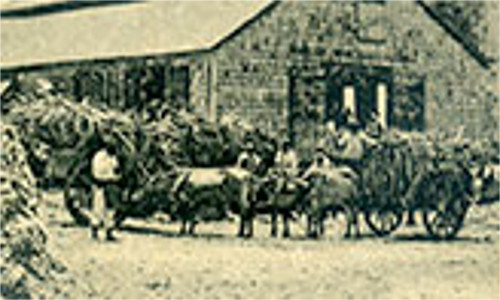
In 1916, in the middle of the First World War and in the face of low wages and attempts to limit emigration to Cuba and the Dominican Republic, Joseph Nathan organized a petition requesting uniform wages for agricultural workers and government regulation in setting the size of tasks and hours of work. However the Administration felt that it had no right to interfere in relations between a planter and his labourers. In November of that same year, undaunted by this response and perhaps even motivated by it, Nathan and others announced the formation of a trade union. Combining the objectives of a trade union and a benefit society, the organizers set as their goals the unity of all classes of labourers, the achievement of fair wages from all employers, the provision of a Christian burial, and assistance for the sick and injured members.
Dues consisted of a one time registration fee of one shilling, then weekly subscriptions of 8 pence for tradesmen, 6 pence for male labourers and 3 pence for females. Those joining were expected to be disciplined and law-abiding at all times and to respect the decisions of the Governing body especially in matters concerning wage negotiation and industrial action.
The organizers of the new union were self-employed businessmen. The first president was Frederick Solomon a contractor and undertaker who had been motivated by workers’ complaints about low wages. The other officers were Joseph Nathan, the owner of the International Supply Association, a small retail business and George Wilkes, a barber. Both Nathan and Wilkes had lived in the United States for some years and had experienced the humiliation of racism and the benefits of organisation in the work place. These life-lessons governed their attitude towards the planters and the Administration. Also among the organizers were William Seaton and A. St. Clair Podd both with strong connections to the merchant class and with concerns that were of a philanthropic nature. Their presence in UBA was short lived although they continued to take an interest in the welfare of workers.
On the 22nd November 1916, the legislature passed the Trades and Labor Unions Prohibition Ordinance through all its readings. The new law imposed a fine of £50 or 6 months imprisonment on anyone attempting to form a trade union and was to last for the duration of the war. It was felt that the formation of a Union would lead to strikes and riots. There was also grave concern over the indubitable involvement of shiftless labourers returning from the Dominican Republic. Included were men who would have been waiting in Basseterre for transport to neighbouring islands as St. Kitts was then a drop off and pick up point.
Despite the new law and the general hostility of the planter class, Solomon, Nathan and Wilkes decided to continue their efforts to organize the workers. To get around the recently passed ordinance they created a friendly society – the Universal Benevolent Association. Solomon became the first president, Nathan its secretary and Wilkes held the post of treasurer. By August 1917, they claimed they had a membership of 1500 and £208 in benefit funds. The Association’s main objective was the repeal of the Masters and Servants Act of 1849. This law saw as a criminal offence, the breach of the work contract by a labourer, however an employer who broke his contract with his workers was only liable for damages or wages owed, therefore his breach was only a civil matter. While recognizing the need to review the Act, the Colonial Office did not want to seem to be giving in under pressure.
Meanwhile the UBA continued its efforts to organize estate workers but with limited success. In October 1917, workers at Willett’s and Belmont most of whom lived in St. Paul’s went on strike. Nineteen of them were called to face charges of breach of contract, or as the workers called it “Bridge of Contract” under the old law. Magistrate Wigley fined each of the defendants eight shillings or ten days imprisonment. The workers refused to pay the fines and walked to Basseterre to serve their sentence. The UBA appealed for their release but without success. Administrator Burdon refused to intervene as the St Paul Martyrs had deliberately chosen imprisonment.
The Administration was clearly aware of the root cause of these developments. The high cost of necessities had not been matched by increased wages and yet the planters continued to make great profits. To avoid further problems, the Acting Governor requested a wage increase to allow workers to better cope with war prices. Reluctantly the planters yielded.
Frederick Solomon died suddenly in 1918 and the mantel of leadership was taken up by J. Matthew Sebastian, who up to that point had been a teacher. Sebastian was also responsible for publishing The Union Messenger. The name of the newspaper was a reflection of what people thought the role of the UBA was supposed to be.
The concept of trade unionism was new in 1916. Workers tended to become organized on impulse as the frustration over low wages and poor conditions reached boiling point. Once their anger had been vented and the arrests, that inevitably followed, were made, then a calm would return, until the next time they became frustrated. The organizers of the UBA were offering sustained organization and collective bargaining power, but it was going to take a disciplined and educated workforce to recognize the advantages of unionization. This came about in 1940 when the first Trade Union was registered under the Trade Union Ordinance of 1939 and found its strength in the sustained collective efforts of the sugar factory workers.




